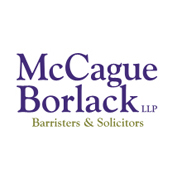Overview
This case arose out of injuries sustained by an individual when ice allegedly fell from an above canopy onto her head as she was exiting a grocery store. The plaintiff sued the property owner (represented by Michael Kennedy at McCague Borlack LLP), who in turn sued its winter maintenance contractor for contribution and indemnity pursuant to a hold harmless clause in its contract.
The dispute between the property owner and the winter maintenance contractor ended in summary judgment, the circumstance of which was triggered by the contractor bringing a summary judgment motion against the property owner on the argument that the contractor was only responsible for ground-level snow and ice removal, not for the canopy in question. In response to the motion, the property owner brought a cross-motion for summary judgment, arguing that the contract required the contractor to be responsible for the canopy, meaning a hold harmless clause in the agreement effectively ended the dispute.
The ultimate decision, for the reasons that follow, was that McCague Borlack LLP's client was entitled to summary judgment.
Background
The contract included a hold harmless agreement... |
The circumstances of the case involved a property owner soliciting tenders for a contract for winter maintenance services. The contract included a hold harmless agreement requiring the successful bidder to hold the property owner harmless against all losses, even in cases where the property owner itself was negligent.
In his interpretation of the contract, the summary judgment motion judge considered the plain text of the contract, as well as the surrounding circumstances known to the parties at the time of the contract's formation. The surrounding circumstances here are that the property owner tendered bids for the snow removal of all parking areas, entrances, exits, canopies, roadways, shipping areas, garbage enclosure areas, sidewalks, walkways, islands, cart corral and mailbox, telephone and bank machine areas to be cleared of snow.
Despite the contractual language, the winter maintenance contractor's evidence was that it never maintained the canopy, and that the property owner was aware of this fact and never requested canopy maintenance at any time following the contract formation. The contractor relied on the property owner's own maintenance activities (specifically that its own employees had previously knocked ice from the canopy) in support of its position. The contractor, therefore, argued that the property owner had waived that provision of the contract.
The property owner, in response, argued that the contract explicitly stated that it formed the entire agreement and required any amendments or changes to the contract had to be in writing (commonly known as “entire contract” clauses). As such, and since there were no written amendments, the property owner argued that the contractor's argument that its scope of work had been altered or waived should not be accepted.
The Decision
The Ontario court of Appeal discussed entire agreement clauses in Shelanu Inc. v Print Three Franchising Corp, [2003] OJ No. 1919. The court explained that if parties to a contract have, by their subsequent conduct, amended a written contract, the court will not enforce the written contract. This holds true even if there is a clause within the contract requiring changes to be made in writing.
In responding to the contractor's argument and evidence, the motion judge made clear that evidence of subsequent conduct will be admitted only if the contract remains ambiguous after considering its text and surrounding circumstances. In this case, the motion judge held that the contract was not ambiguous in regards to the description of work to be performed. As such, no subsequent conduct of the parties was permitted to aid in the interpretation of the contract. Based on the text and surrounding circumstances, it was commercially reasonable to infer that the property owner sought a contract inclusive of all winter maintenance at the premises, including ice removal from the canopy.
In making its determination to give effect to the “entire contract” clause, the court was persuaded by the sophistication of both parties and the tendering process, which made it incumbent upon the winter maintenance contractor to meet its obligations. The court further held there was no subsequent attempt to amend the contract based on conduct of the parties; instead, the winter maintenance contractor simply abdicated its responsibility from the outset of the agreement by never servicing the canopy. The court also provided insightful discussion for commercial parties in service agreements–any subsequent conduct by one party completing a task for which an alternate party holds responsibility is not evidence of the acting party assuming responsibility of same.
The motion judge consequently held that the property owner had neither waived nor implied that the winter maintenance contractor could forego its contractual obligation with respect to the canopy. As such, the winter maintenance contractor's motion for summary judgment failed.
...contractor agreed to accept responsibility for certain risks. |
With respect to the hold harmless agreement, the motion judge agreed that, by signing the contract, the winter maintenance contractor agreed to accept responsibility for certain risks. Specifically, the contractor agreed to indemnify the property owner for every loss, cost or expense which the property owner suffers as a result of a breach by the contractor of any term of the contract, or as a result of anything arising from or related to the work, regardless of whether the property owner itself was also negligent.
The court, in interpreting the hold harmless provision, agreed that the clause effectively shields the property owner from any liability that may be imposed upon it by anything related to the contractor's work. Therefore, the motion judge held that the winter maintenance contractor was required to relieve the property owner from “any and all financial consequences of the within action, in addition to covering the plaintiff's damages, if any.” As such, the court held there was no genuine issue requiring a trial to determine liability between the property owner and the contractor; summary judgment was granted in favour of McCague Borlack LLP's client–the property owner–with the result being that the contractor was required to both defend and indemnify the property owner in the action.
Conclusion
This decision provides a useful discussion on several legal issues in the commercial context. The court laid out the course to follow when interpreting commercial contracts. Additionally, a majority of case law surrounding entire contract clauses focus on clauses only with statements regarding representations and warranties known at the time of contract formation. This decision will be useful in the commercial setting for determining whether to apply an entire contract clause when this clause includes a statement permitting amendments only with written consent.
This decision also included a practical discussion on the issues of waiver and estoppel, specifically outlining that direct evidence of a party assuming responsibility for an obligation is required in order for this doctrine to be triggered.
Finally, the court made clear the weight a hold harmless clause will have on a commercial contract between two sophisticated parties–undoubtedly valuable insight and information for all contracting parties.
Read the full decision.


